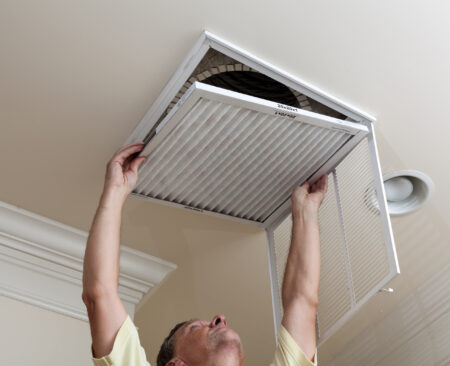Several factors can affect Raleigh, NC, air quality, such as pollution and pollen. This forces people indoors in many cases as they try to find relief from allergies and respiratory symptoms. Unfortunately, indoor air quality (IAQ) can be just as bad as the air that’s outside.
Additional contaminants can include pet dander, volatile organic compounds (VOCs), dust, dust mites, and mold spores. Fortunately, you have a bit more control over your indoor air quality than you do over the outdoors. Let’s look at the different types of air filters and how they impact IAQ.
Traditional HVAC Filters
Your HVAC system has a filter that is used anytime your heating or cooling equipment is in use. These filters range in quality, with some being able to trap particles as small as 0.3 microns in size. Others don’t do as good of a job. When shopping for an HVAC filter, you need to look at its MERV rating. MERV stands for minimum efficiency reporting value, which represents how many particles a filter can trap and what kind of air will flow through that filter.
A lot of people assume that buying the highest MERV-rated filter possible will improve their indoor air quality, but this can be a problem. A filter with a very high MERV rating may restrict airflow within your HVAC system, leading to heating or cooling equipment malfunctions. Costly repairs and a decreased lifespan of your unit can result. You can speak with a knowledgeable HVAC professional to determine what the best MERV rating is for your specific HVAC system and air quality needs.
The Use of HEPA Air Filters
HEPA filters, or high-efficiency particulate air filters, are typically made from polypropylene or fiberglass. They trap a substantial number of particulates, as much as 99.97%. This is an affordable air filter option that is often used with air purification devices. You usually want to stay away from HEPA products when it comes to purchasing a filter for your furnace. Most units won’t be able to handle the restricted air flow that they create.
Activated Carbon Filters
Activated carbon is an excellent feature that many air filters utilize. You can find filters that are strictly made from activated carbon, but there are also traditional pleated filters that contain carbon as one of their layers. Carbon does a great job of reducing volatile organic compounds as well as particulate matter. VOCs come from things like chemical cleaning products, air fresheners, beauty products, perfume, new carpet, building materials, furniture, and paint. They can have a devastating impact on our health, which is why it’s so important to reduce exposure. Unfortunately, we can’t completely remove VOCs from our homes, but air filters can have a profoundly positive impact.
Electrostatic Filters
Electrostatic filtration is used with air purification devices and relies on static electricity to remove particulate matter from indoor air. Charged collection plates attract oppositely charged particulate matter before cleaner air passes back through. What’s nice about electrostatic filters is that they’re not necessarily filters at all. They are metal collection plates that need to be cleaned periodically. This reduces the cost of maintaining your system.
Washable Filters
In addition to electrostatic filters that can be cleaned and replaced in their housing, there are washable, pleated filters. Rather than replacing a filter every 30 to 90 days, you simply pull it out, wash it, let it dry, and place it back in your HVAC system. These filters tend to be made of higher-quality materials that do a good job of removing particles from your indoor air. You’ll want to have a second filter on hand that you can use when the other filter is drying. This way, you won’t have to switch your HVAC system off while it’s awaiting a filter.
One downside to washable filters is that they can be hard to clean. If you or someone in your home has severe allergies or respiratory issues, it may be best to use a replaceable filter. This way, you’ll know that a filter change will provide optimal indoor air quality.
Air Purification Devices
In addition to using your HVAC system to reduce particulate matter from the air in your home, you can obtain a whole-house unit to further purify your air. This system is installed as part of your HVAC system, reducing particulate matter from the air that’s flowing through your ductwork and into your living quarters. Air filtration devices use different types of filters and technology to promote healthier indoor air. UV-C light technology is a common component. As air passes through the UV-C light, pathogens, bacteria, and viruses are destroyed. This promotes a very sterile environment in places like hospitals, but it can also be used in a residential setting.
The Frequency of Filter Changes
Filters can do an exceptional job of improving your indoor air quality but only if you’re using the right ones and switching them out periodically. The exact time frame for changing your filters will depend on the type of filters you’re using and the directions from their manufacturer. In most cases, filters are removed and replaced every 30 to 90 days. They may need to be changed more often if you’re running your equipment very frequently or it’s a high-pollen time of year. Also, homes with pets can benefit from more frequent filter changes.
If you’ve recently had renovations or other major work done in your home, it’s a good idea to change your filter as soon as the work is complete. You may even want to consider having your ducts cleaned to provide you with a fresh start to healthy indoor air quality.
Why Your Ductwork Matters
Once air has flowed through a filter, it will circulate throughout your home by way of ductwork. These ducts can become coated with particulate matter and debris over time, regardless of how effective your filters are. This is more common if your ductwork is damaged, allowing air to flow into your ducts through various spaces. Consider a professional ductwork inspection in addition to routine maintenance of your HVAC equipment once a year. This process involves the use of specialized camera equipment (in addition to a visual inspection) to check all the various spaces of your ductwork.
If you are concerned with the quality of the air inside your Raleigh home, reach out to our team at Thermo Direct. We can perform an indoor air quality assessment to determine what is having the most profound impact on your IAQ. From there, we will provide you with recommendations that can help improve your indoor air. This includes things like upgraded filters, whole-house air purification devices, humidifiers, and dehumidifiers.
In addition to indoor air quality services, we install, repair, and maintain heating and cooling equipment. We also work on electrical equipment like generators, lighting, ceiling fans, and breaker boxes. Our plumbing services include drain cleaning, repairing burst pipes, detecting leaks, performing inspections, and more.
Contact Thermo Direct today to schedule an appointment!









